
Geert Wilders’ anti-Islam far-right Party For Freedom and the centrist D66 were tied with nearly all votes counted in the Dutch general election in an unprecedented neck-and-neck race to become the biggest party.
The near-total count tallied and published by Dutch national news agency ANP and cited by Dutch media showed each party winning 26 seats.
The nail-biting finish is expected to lead to delays in starting the process of forming a new coalition. No Dutch election has previously ended with two parties tied for the lead.
D66 notably almost tripled its seat count, marking the election’s largest gains, contrasting sharply with Mr Wilders’ party, which declined significantly from its 2023 record.
“This is the best result for D66 ever,” 38-year-old party leader Rob Jetten told a crowd of party insiders and media after he had been welcomed with chants of the party’s optimistic election slogan “Het kan wel”, or “It is possible”.
Mr Wilders’ Party for Freedom is forecast to lose 11 seats in the 150-seat House of Representatives, while D66 gains 17.
Mr Wilders insisted his party, known by its Dutch acronym PVV, should play a leading role in coalition talks if it is the largest.
“As long as there’s no 100% clarity on this, no D66 scout can get started. We will do everything we can to prevent this,” he said. A scout is an official appointed by the winning party to look into possible coalitions.
But all major mainstream parties have ruled out governing with Wilders after he brought down the last coalition led by his PVV, leaving him no viable path to a majority.
The result instead seems to open a path for Jetten to form a government as the youngest ever prime minister of the Netherlands.
Jetten’s popularity surged in the past month, as he campaigned on a promise to resolve a housing shortage, invest in education, and tackle immigration concerns.
Wilders, one of Europe’s longest-serving populist leaders, is known for his anti-Islam stance and lives under constant protection due to death threats.
He had proposed denying all asylum requests – which would violate EU treaties – sending male Ukrainian refugees back to Ukraine, and halting development aid in order to finance energy and healthcare.
Wilders led his party to a stunning first-place finish in the 2023 election and formed an all-conservative coalition, although his partners refused to endorse him as prime minister.
He brought the government down in June over its refusal to adopt his hardline measures.
The Dutch election was seen as a test of whether the far-right can expand its reach or whether it has peaked in parts of Europe. The outcome may suggest there are limits to its enduring appeal.
With 76 seats needed to form a governing coalition in the Netherlands’ parliament, at least four parties will be required. One scenario is a pact including D66, the conservative Christian Democrats, the centre-right VVD, and the Greens-Labour party.
However, building stable coalitions is tough and talks are expected to take months.
Political scientist Henk van der Kolk said a possible path forward exists with a centrist coalition of D66, the centre-left bloc of the Labour Party and Green Left, the centre-right Christian Democrats and the right-wing People’s Party for Freedom and Democracy.
In another fallout from the vote, former European Commission vice president Frans Timmermans said he was quitting Dutch politics after the centre-left bloc he led lost seats in an election it had hoped to win.
The election is “unlikely to mark the end of populism in the Netherlands,” said Armida van Rij, senior research fellow at the Centre for European Reform think tank.
Reuters and Associated Press contributed to this report
